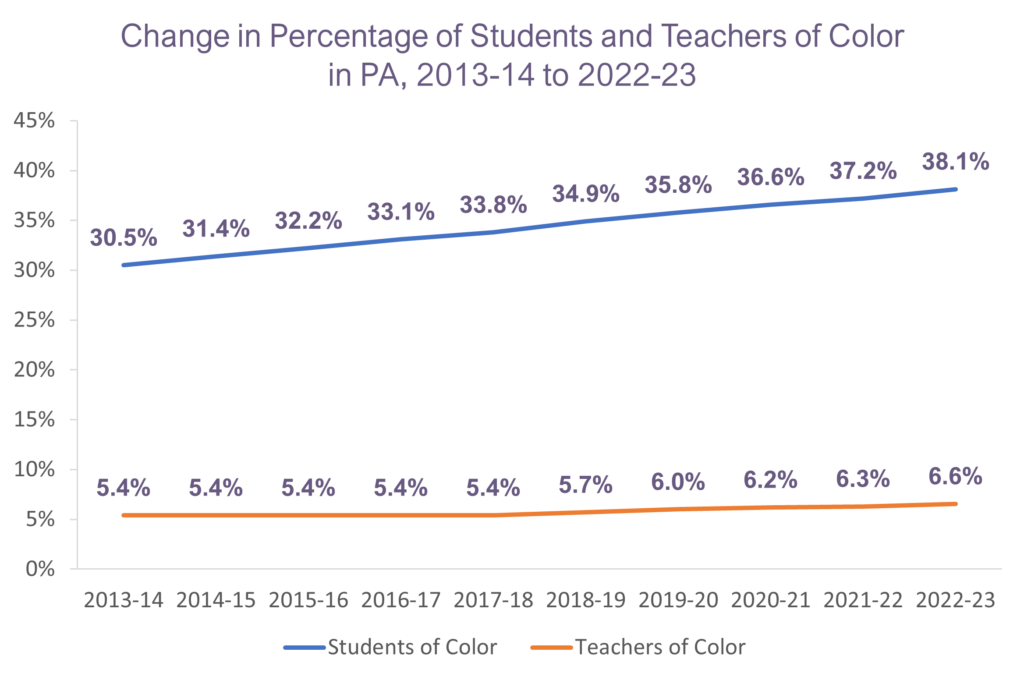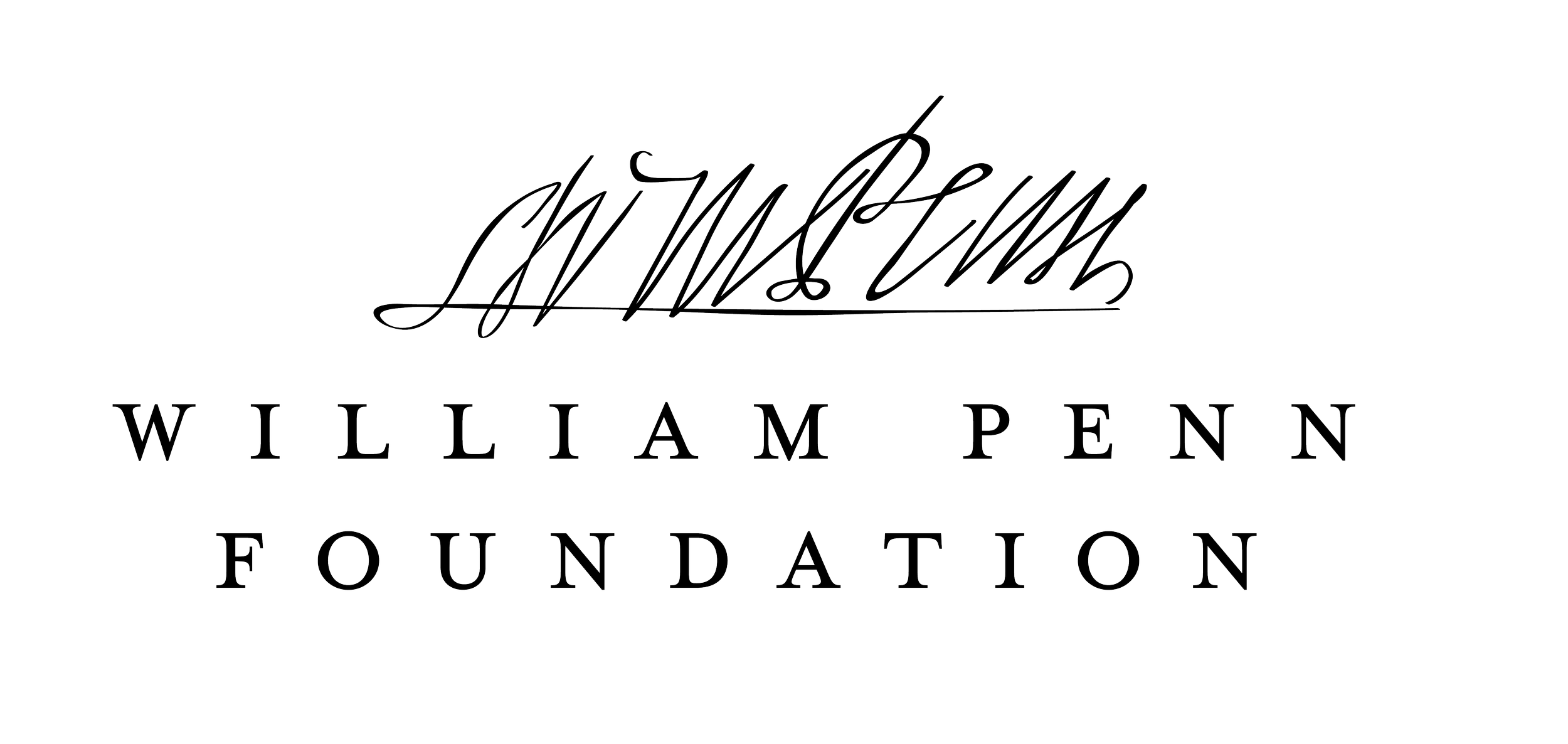
Pennsylvania Educator Diversity Research
 This page provides a central repository of RFA’s recent research related to educator diversity in Pennsylvania’s public schools, including links to download the most current teacher diversity data cleaned and published by RFA.
This page provides a central repository of RFA’s recent research related to educator diversity in Pennsylvania’s public schools, including links to download the most current teacher diversity data cleaned and published by RFA.
With an influential 2018 report entitled Patching the Leaky Pipeline: Recruiting and Retaining Teachers of Color in Pennsylvania, RFA brought a renewed focus on the importance of teacher diversity by examining available data and reviewing promising policy initiative at the local, state, and federal levels for increasing diversity all along the pipeline. One takeaway from that work was that, while education agencies regularly publish detailed data on student demographics, data on teacher demographics is much less readily available.
To fill that information gap, RFA began to annually request and clean records from the Pennsylvania Department of Education and merge these with public student data to calculate the percentages of teachers and students by race/ethnicity and gender at the state, county, district, and school levels for all Pennsylvania public schools. These files of Teacher and Student Demographic Data are available for download here:
The links below provide easy access to the project pages for RFA’s recent research related to Pennsylvania’s educator diversity:
- American Educational Research Association Annual Meeting – Presidential Session: Prioritizing Educator Diversity Research: These slides from RFA’s April 2024 presentation at AERA tell the story of RFA’s journey of learning, reflection, and insight in our efforts to prioritize and expand educator diversity research.
- Small but Mighty: Lessons from Black Teachers’ Experiences in Allegheny County: To understand the decline in the number of Black teachers in Allegheny County, this community-informed research project engaged Black teachers in the area through extensive interviews and focus groups. Teachers shared rich data on their experiences and recommendations on how to reverse recent trends.
- Allegheny County Teacher and Student Demographics: 2022-23 Update: This ACER brief updates RFA’s prior analyses, finding that in 2022-23, teachers of color represented just 4.6% of teachers in Allegheny County. The county’s student-to-teacher race disparities are larger than state and national disparities and are growing. Moreover, the data reveal a decades-long decline in the number of Black teachers that is not fully explained by overall trends in community demographics.
- Research to Inform Educator Diversity Initiatives in Pennsylvania: These slides, presented at the Pennsylvania Educator Diversity Consortium’s 4th Annual Virtual Summit in June 2023, include data analysis current to the 2022-23 school year and also provides a brief update on RFA’s ongoing Allegheny County Black Teacher Study and additional research to support PEDC’s efforts to increase educator diversity in Allegheny County.
- Pennsylvania School Funding and School Staffing Disparities: This study examines the relationship between school funding in Pennsylvania and student access to teachers, administrators, and professional support staff, including finding that teachers, administrators, and other professional staff of color are concentrated in the most inadequately funded and understaffed Pennsylvania school districts that pay less and have greater student needs, which aligns with research findings that teachers of color are often assigned to the most challenging working conditions.
- “Worn & Weary” Black Teachers’ Storied Experiences and Recommendations around their Attrition and Retention in Philadelphia Schools: This study centers the perspectives from a sample of 30 current or former Black teachers in Philadelphia about systemic factors that contribute to Black teacher attrition and the elements that sustain teachers who persist in teaching despite challenges. The report includes participant recommendations for specific supports, systems, and resources needed to address barriers to recruitment and retention and ultimately increase educator diversity in Philadelphia schools.
- The Need for More Teachers of Color: This booklet accompanied a Teach-In hosted by RFA in April 2022, in FDR Park in Philadelphia. The booklet highlighted findings from RFA’s past studies, with updates for 2020 -21 data on the state of teacher diversity in Pennsylvania as a whole and in Philadelphia. Also included were several new analyses, including how teacher diversity has changed in Philadelphia over the past 20 years. A key finding was that Philadelphia public schools, (district and charter schools combined) employed nearly 1,200 fewer Black teachers in 2020-21 than 20 years ago, even as numbers increased for other race or ethnicity subgroups.
- Final Report: Evaluation of the Aspiring to Educate Philadelphia Pilot: This September 2021 report provided RFA’s evaluation of the Pennsylvania Department of Education’s A2E pilot, which was designed to diversify and develop the teacher workforce. The report describes the goals and overall structure of the pilot; activities that took place; highlights and innovations; and learnings that can inform the creation of similar initiatives.
- FAQ: Allegheny County Teachers of Color: This April 2021 FAQ examines the state of teacher diversity in Pittsburgh and Allegheny County.
- Teacher Diversity in Pennsylvania from 2013-14 to 2019-20: This December 2020 report presents the findings of RFA’s examination of seven years of teacher demographic data in Pennsylvania.
- New Data on Teacher Diversity in Pennsylvania: This September 2018 brief presented RFA’s first analysis of data received from the Pennsylvania Department of Education.
- Patching the Leaky Pipeline: This April 2018 report examines the leaks in Pennsylvania’s teacher pipeline contributing to a lack of diversity and highlights promising practices found across the country that could increase teacher diversity and identifies the appropriate agencies and levels of policymaking that could implement these practices.
RFA wishes to express gratitude to the funders whose generous support has made and continues to make possible this important educator diversity research.
 |
 |
|
 |
||
 |
 |
|
 |
 |
|